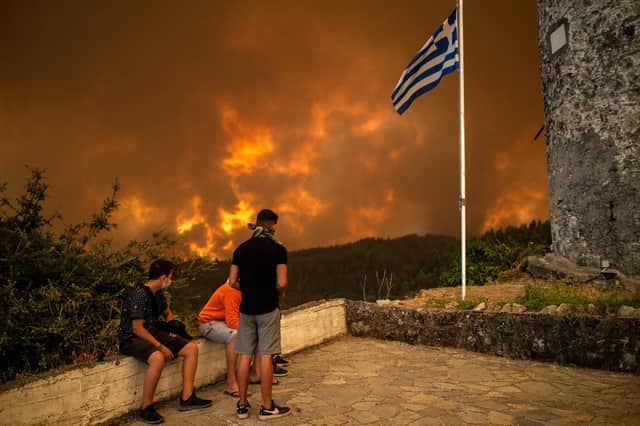New UN report to set out stark reality of the climate crisis


The report from the UN’s Intergovernmental Panel on Climate Change (IPCC) published on Monday is the first part of a review of current scientific knowledge about how the world is warming due to human activity.
It is the first such global assessment since 2013, when scientists found that global warming was “unequivocal” and human influence on the climate was clear, with the majority of warming since the 1950s extremely likely to be down to human activity.
Advertisement
Hide AdAdvertisement
Hide AdThe message in the latest report is expected to be even stronger, with warnings of how soon global temperatures could rise 1.5C above pre-industrial levels – a limit that countries have pledged to try to avoid breaching because of the dangerous consequences for humanity.
Drawing on more than 14,000 scientific papers, the review is set to provide the latest knowledge on past and potential future warming, how humans are changing the climate and how that is increasing extreme weather events and driving sea-level rises.
A summary report is being published after being approved in a process involving scientists and representatives of 195 governments that has taken place online over the last two weeks.
That means governments have signed off on the findings – and pressure will be on them to take more action at global climate talks known as Cop26 which are being held in Glasgow in November.
Professor Piers Forster, from Leeds University, one of the scientists involved in the process, said: “This report will be able to say a whole lot more about the extremes we are experiencing today and it will be able to be categoric that our emissions of greenhouse gases are causing them and they are also going to get worse.”
He told LBC Radio: “The report will come with quite a lot of bad news about where we are and where we’re going, but there are going to be nuggets of optimism in there which I think are really good for the climate change negotiations.
“The first one is that, if can really get our act together to cut our greenhouse gas emissions within the next 10-year timeframe and to get to these net-zero targets that everyone is talking about, there’s a good chance we can try and keep temperatures in the longer term below 1.5 degrees.”
The report released on Monday is the first part of the sixth global assessment of climate science to be undertaken since the IPCC was formed in 1988.
Advertisement
Hide AdAdvertisement
Hide AdIt looks at the physical science of climate change, with further parts of the review covering impacts and adapting to climate change, and solutions to the crisis, will be published in 2022.
The report comes as global temperatures have climbed to 1.2C above pre-industrial levels and increasingly extreme weather – from record heatwaves and wildfires to downpours and devastating flooding – hits countries around the world.
Despite the growing spectre of climate change, governments are not taking enough action to tackle the greenhouse gas emissions from human activity such as burning fossil fuels for heating, transport and power supplies to curb rising temperatures.
UN climate chief Patricia Espinosa has warned that many countries have not brought forward new action plans for cutting their emissions – a key part of what they need to do before the Cop26 climate summit – and those that have are not doing enough.
Globally, action pledged to tackle the emissions pushing up temperatures is not enough to limit warming to 2C above pre-industrial levels, let alone the tougher 1.5C target.
A special report from the IPCC in 2018 warned that overshooting the 1.5C limit would mean more extreme weather, greater sea-level rises, and damage to crops, wildlife and health.
Curbing rises to 1.5C would require cutting carbon emissions by 45% by 2030, on a path to reducing them to zero overall by 2050, with significant changes to transport, how we heat and power homes, industry and agriculture, it said.
Ahead of the publication of the new assessment from the IPCC, Richard Black, senior associate at the Energy and Climate Intelligence Unit, said: “Coming just before Cop26, this report is a massive wake-up call to all those governments that have not yet put forward realistic plans to cut emissions over the next decade.
Advertisement
Hide AdAdvertisement
Hide Ad“It will show that choices made now have a big effect on our future – leading to a runaway world of wild weather impacts and incalculable risks at one end, and at the other a future where climate change is constrained within manageable bounds.”
Doug Parr, Greenpeace UK chief scientist, said: “Over the past decades, scientists have done a terrific job of warning about the impacts of the climate crisis, and world leaders have done a terrible job of listening.
“This year, this has to change. We don’t need more pledges, commitments and targets – we need real action right here right now to cut planet-heating emissions as fast as possible, phase out fossil fuels, transform our food system and deliver more cash to the countries worst hit by the climate crisis.”
And Fredrick Njehu, Christian Aid’s senior climate change and energy adviser for Africa, warned: “We’ve seen in recent weeks heatwaves in North America and floods in India, Europe, China and London. In Africa we have lived with the destructive nature of the climate emergency.
“Whether it was Cyclone Idai, changing rainfall patterns or overbearing heat, Africa has been waiting for the rest of the world to catch up and act on climate change for years.
“The important thing now is that rich world governments make up for lost time and act quickly to reduce emissions and deliver promised financial support for the vulnerable.”
Comments
Want to join the conversation? Please or to comment on this article.